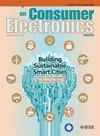Holographic Counterpart Computation Offloading via Reconfigurable Intelligent Surfaces in VEC Consumer Electronics
IF 10.9
2区 计算机科学
Q1 ENGINEERING, ELECTRICAL & ELECTRONIC
引用次数: 0
Abstract
In vehicular edge computing (VEC) Consumer Electronics networks, the integration of holographic counterpart technology presents significant challenges due to its stringent requirements for high data transmission rates and communication reliability. Traditional task offloading methods, constrained by suboptimal communication link quality and energy limitations, are inadequate to meet these demands. This paper introduces a groundbreaking system that synergistically combines wireless power transfer (WPT) and reconfigurable intelligent surfaces (RIS) to significantly enhance both communication performance and computational efficiency. Leveraging deep reinforcement learning (DRL), our system achieves joint optimization of task offloading strategies and resource allocation. Departing from conventional dynamic RIS designs, we implement a fixed phase shift matrix approach, which not only simplifies system implementation but also reduces computational complexity, thereby enhancing both task offloading efficiency and system stability. Extensive simulation results demonstrate that our optimized RIS-assisted approach achieves a remarkable 38.30% improvement in computational rates compared to non-RIS schemes and a 4.83% enhancement over random-phase RIS configurations. These substantial improvements highlight the transformative potential of RIS in boosting computation rates and providing robust solutions for high-demand task offloading scenarios. Our innovative system design represents a significant advancement in intelligent vehicular networks and edge computing technologies, offering substantial application potential for holographic projection task offloading in next-generation vehicular systems.基于可重构智能曲面的VEC消费电子全息对等体计算卸载
在车载边缘计算(VEC)消费电子网络中,由于对高数据传输速率和通信可靠性的严格要求,全息对等体技术的集成面临着重大挑战。传统的任务卸载方法受通信链路质量和能量限制的限制,已不能满足这些需求。本文介绍了一种开创性的系统,该系统协同结合了无线电力传输(WPT)和可重构智能表面(RIS),以显着提高通信性能和计算效率。我们的系统利用深度强化学习(DRL)实现了任务卸载策略和资源分配的联合优化。与传统的动态RIS设计不同,我们采用了固定相移矩阵的方法,不仅简化了系统实现,而且降低了计算复杂度,从而提高了任务卸载效率和系统稳定性。大量的仿真结果表明,与非RIS方案相比,我们优化的RIS辅助方法的计算率提高了38.30%,比随机相位RIS配置提高了4.83%。这些实质性的改进突出了RIS在提高计算率和为高需求任务卸载场景提供强大解决方案方面的变革潜力。我们的创新系统设计代表了智能车辆网络和边缘计算技术的重大进步,为下一代车辆系统中的全息投影任务卸载提供了巨大的应用潜力。
本文章由计算机程序翻译,如有差异,请以英文原文为准。
求助全文
约1分钟内获得全文
求助全文
来源期刊
CiteScore
7.70
自引率
9.30%
发文量
59
审稿时长
3.3 months
期刊介绍:
The main focus for the IEEE Transactions on Consumer Electronics is the engineering and research aspects of the theory, design, construction, manufacture or end use of mass market electronics, systems, software and services for consumers.

 求助内容:
求助内容: 应助结果提醒方式:
应助结果提醒方式:


